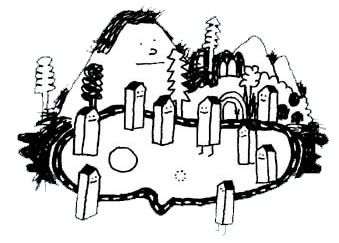

I've arrived back in Tokyo after my Christmas/New Year's vacation in Australia to receive a real punch in the guts - Cisco Records, undoubtedly one of Tokyo's best electronic music shops, have closed their doors.
Cisco has been an integral part of Tokyo's music scene for years; a report on the closure over at Beatportal says Cisco opened their first Shibuya shop in 1976 (as a progressive rock store), and were the only place stocking Kraftwerk records during the 70s. And Cisco has certainly been an integral part of my electronic music experiences; when I first fell in love with electronic music in 2001, Cisco swiftly became one of my most regular and trusted ports of call when hunting down vinyl and CDs. Mille Plateaux, Force Inc., Basic Channel, Kompakt ... all of the labels and artists I was learning about and getting excited about could be found at Cisco Records.
Before too long Cisco became part of my weekly ritual in Tokyo. I'd walk into the store, check out the new releases, listen to some of them, listen to what was being played in the store generally, and check out the wall of flyers for upcoming parties. Knowing that I won't be able to do that anymore, that a part of my life is now forever in the past, most definitely fills me with a feeling of grief.
Of course, you've probably Googled Cisco Records by now and discovered that they still have a website. Indeed they do. Cisco will be selling CDs and vinyl online. Cisco can still deliver to your door.
But, for me, that's no consolation at all. Because what I felt when I walked into Cisco Records was the sense of community. A real, embodied community, and that I was a part of it. It's kinda hard to feel connected to a community when all you're doing is clicking the order button in the comfort of your own home.
Cisco Records was, for me, an experience, and it's an experience that (for me) cannot be replicated by online shopping. All of the wonderful accidents that happened to me in Cisco, such as walking in and hearing something playing, and asking the clerk what it was, thereby learning something new. Checking out the wall of flyers and discovering an upcoming party that I hadn't heard about. Strangers striking up conversations with me because we were grabbing the same records or flyers, and eventually becoming friends.
(Can the online shopping experience replicate these things? Really?)
All of these things happened to me at Cisco, and this is because Cisco was a focal point for Tokyo's electronic music scene. Cisco was where the community came together. Cisco's passing is a real loss for Tokyo's electronic music community.
Pete's two cents:A question: what are the broader implications of Cisco’s closure?
About a year ago, I wrote a piece for Resident Advisor about the survival of vinyl. A year on, I remain committed to what I wrote, but unable to support my opinion with any kind of conviction.
In Melbourne, Synaesthesia, Slap, Rhythm and Soul and Substrata, the four best outlets for electronic music of various kinds, have all closed their doors in the last few years. This is understandable in Australia, where an EP sets you back $20 AU (which is about 12 euro at current exchange rates). With the rise of the Australian dollar, it became viable (in fact, often cheaper) to place a mail order (with Phonica, Juno, Hardwax and the like) and have exactly what you like delivered to your door within two weeks, which was often a helluva lot better than the often slim pickings at the local record stores (forced to buy strategically for a small, diverse market). To cut a long story short, I was unsurprised that record stores washed up in Melbourne pretty early in the piece. A city of 3,500,000 in the wrong hemisphere was always going to be a marginal proposition for something as niche-y as electronic music.
However…
Cisco is/was THE techno specialist record store in Tokyo, a megalopolis of 20,000,000 (and counting) and the home of cashed-up middle-class 20-something geeks who overwhelmingly (unlike their Western brethren) have aesthetic and romantic qualms with using digital. Tokyo is one of the homes of digging – maybe the last home? Not being enticed by the beige beauties on offer, digging for records (along with ramen) became one of the key things that kept me keeping on in Tokyo when the reality of living in a neon-lit wasteland got me down. Seeing Cisco closed when I went there was foot in the teeth. Something is really over, and I can’t deny it any longer.
More than that, Tokyo was/is also one of the global capitals of minimalist groove music of all stripes. Maybe the writing was on the wall the day the Shinjuku Liquid Room closed… and then there was the closure of (doggedly minimal techno) club Maniac Love a few years back… no more Metamorphose festival… now no Cisco? It’s no stretch to say that Tokyo more or less kept electronic music alive – or well fed, at the very least. Without their lucrative tours to Japan, many of the artists you know and love would never have been able to quit their day jobs. Berlin is cool, sure, but show me the money. But if you can live in Berlin and tour to Japan twice a year…. but what happens when that becomes impossible, because the only clubs left are the kind that book electro-shouty rubbish to play to e-d up kids who are in it for the image?
Now lets ask a serious speculative question: lets say Fabric and the Panoramabar close in a year of two… what bastion will remain? Which place will have the critical mass to remain the ‘capital of techno’? Ibiza?
In my humble opinion, if Tokyo can’t support Cisco…
… vinyl is definitively dead…
…and techno is on life support…
My deep, deep fear with this is that the music is being hollowed out from the inside. Between Beatport and private trackers, the whole movement is becoming just another computer game with a social networking bent, governed by image (front of shop) and built by and obsessed over by online geeks with no friends (back of shop). Basically, in five years there will be very little difference between Warcraft and Beatport – and in case you have to ask yourself, this is not a good thing.
Clubland will continue in rude health (as an outpost of hedonistic hyper consumption), ‘connected’ to the ‘music’ that feeds it, which will be a collage of patterns swapped and built like Lego blocks or Ikea furniture by geeks on laptops who are uncomfortable buying records off living people (or playing finished pieces of music), and who sell loops instead of tracks (to increase their armor class and grant them privileged access to special plugins and more powerful synth weapons, natch). Meanwhile, the DJ will be some early-adoptor schmo with a wild outfit and an edgy haircut (basically just another geek, but one confident enough to wear designer tights in front of an audience) holding a chrome-plated midi controller designed by Alessi but ‘personalised for each user’ for conducting the action, but with the laptop he carries selecting the best possible tracks to mix and doing the beat-matching for him… the DJ equivalent of Milli Vanilli meets Alex from a Clockwork Orange.
All of which repulses me... it's enough to make me backlash (in the manner of projectile vomiting) all the way back to my noise rock days. Hey, at least the math rock diehards still write songs...
Chris' delayed thoughts on the sorry death of Cisco, aka my first Japanese love.
You like digital, I like bananas, we all should like record shops. I don’t buy records. Never have. The digital revolution is great for me because now I can get all the tracks I used to never be able to get because I refused to submit to the record addiction (from what I’ve seen it is generally more addictive and expensive than nicotine). But. But the death of Cisco greatly upsets me. Despite the fact I would never buy records, I would still go there on a weekly basis. It was ritual. I would buy plenty of cds, find out about all the gigs coming up and get a sense for what is being released. Yes, you can do all this digitally. But it creates a completely different form and sense of community. The comments that have been made so far reflect a similar sense of loss that in the slow (inevitable?) death of record stores you are losing a ‘brick in the wall’ (as one of the comments put it). And I think this really does make a difference – yes we can all still buy and listen digitally, and no I don’t think it means doom and gloom for techno (there are plenty of advantages), but it points towards a fundamentally different, and ultimately not particularly satisfying form of interaction and community. It points towards concepts like ‘silent discos’ where everybody uses headphones on the dancefloor instead – a cute concept perhaps, but also one that completely atomises the crowd and destroys the shared experience of listening to the same speakers and interacting on the dancefloor. So we will all decide digitally and interact anonymously on blogs and boards and so on, but this is a different dynamic and a different form of interaction (these thoughts are also what made me feel strangely uncomfortable about this recent post about the lack of joy from visiting a record store: http://ronanfitzgerald.net/houseisafeeling/2008/01/18/249/). I remember walking into Cisco, hearing something I had never heard before, fumbling in my bad Japanese and asking ‘what is this?’ and walking out with a new cd and a new artist. I can recount plenty more stories from Cisco, most of all which involve my bad Japanese being transcended by a mutual appreciation of good music. And in such an isolating country as Japan, these brief moments of connection are rare and worthwhile. The death of Cisco is a huge loss for me personally, and as Pete rightly notes, not a particularly promising sign for things to come. Cisco is where I first discovered Ricardo Villalobos. Ditto Dan Bell. Ditto plenty others. Sure I will keep on discovering new artists as they appear on my radar, but I am not convinced that the experience will be as personal or satisfying as the kind that a place like Cisco provided. RIP Cisco.










